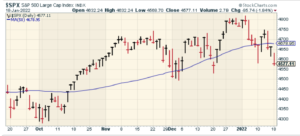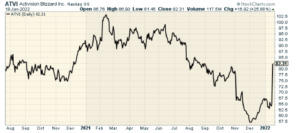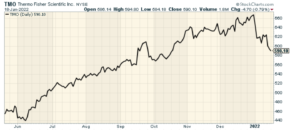CWS Market Review – January 18, 2022
(This is the free version of CWS Market Review. If you like what you see, then please sign up for the premium newsletter for $20 per month or $200 for the whole year. If you sign up today, you can see our two reports, “Your Handy Guide to Stock Orders” and “How Not to Get Screwed on Your Mortgage.”)
The Stock Market Drops to a One-Month Low
The stock market had another rough day today. The index dropped over 1.8%. The poor folks at Goldman Sachs (GS) saw their stock drop by 7%. (Don’t worry too much for them. I have a feeling they’ll be fine.)
At one point, the S&P 500 was down over 2% on the day. The index is still below its 50-day moving average which is often a bad omen.
The S&P 500 has now closed lower seven times in the last ten sessions. The S&P 500 closed lower today than where it was just before Halloween. That means the stock market has been completely flat for nearly three months. That’s actually better than some areas of the market. This Nasdaq Composite is lower than where it was in early July.

Whenever there’s a drop like today, I like to look at how different stock groupings are performing. If growth stocks drop more than value, then I know the market is concerned about valuations. Today, the growth index fell by 1.08% more than the value index. That’s interesting as it signals possible nervousness about the pace of the recent rally.
Further evidence of the market’s desire for safety can be found in the bond market. The yield on the 10-year Treasury soared all the way up to a two-year high. Of course, it seems odd writing that since we’re only talking about a yield of 1.8%. That’s far less than inflation, but it does tell us how much things have changed. Eighteen months ago, the yield on the 10-year was about 0.5%.
Small-cap stocks were especially weak today. The Russell 2000 lost over 3% today. The small-cap indexes are skewed toward domestic manufacturers. I think of the Russell 2000 as a semi-cyclical index. Indeed, we saw some weakness in financial and tech stocks today.
The three worst-performing stocks today in the S&P 500 were all banks: Goldman Sachs (GS), JP Morgan (JPM) and Morgan Stanley (MS). What kind of day was it? Put it this way: Exxon (XOM), Chevron (CVX) and ConocoPhillips (COP) all made new 52-week highs today while Zoom (ZM), Snap (SNAP) and Twitter (TWTR) all made new lows.
Microsoft Buys Activision Blizzard for $68.7 Billion
The big merger news today is that Microsoft (MSFT) is buying videogame giant Activision Blizzard (ATVI) for $95 per share. That works out to $68.7 billion.
That may sound like a lot, and it is, but it’s less than 3% of Microsoft’s overall market value. The deal will be all cash. If you’re curious, Microsoft has $130 billion in cash on hand. This will be Microsoft’s largest deal ever. Globally, three billion people play video games.

Shares of ATVI soared today. The stock closed Friday at $65.39 per share. Interestingly, ATVI jumped to $82.32, which is still well short of MSFT’s offer. Perhaps the market has some reservations about this deal. Or maybe they think it will take longer than expected.
If you were to buy ATVI today and the deal goes through, you’d make a 15% return on your investment. Of course, that’s not a sure thing and we don’t know how long it would take. Also anti-trust regulators have said they want to be tougher on mergers, especially tech mergers.
Activision Blizzard is best-known for being the folks behind Call of Duty and many other games. The stock has been extremely successful. Gaming is a massive industry. In 2020, the U.S. video game market grew to $57 billion. According to NPD Group, that’s bigger than music and movies combined. In 2008, Activision merged with Vivendi and five years later, they split off from them.
Less than a year ago, ATVI reached $104.53 per share. The stock had received some speculative attention lately because it had done so poorly. Last month, ATVI dropped down to $56.40.
Activision Blizzard is one of those companies that seems to generate terrible news for itself and it’s usually their fault. They’re facing several sexual harassment lawsuits. Worse yet, their CEO, Bobby Kotick, allegedly knew about the behavior and failed to inform the board.
Kotick took a 99.9% pay cut which dropped his annual pay from $154 million to $62,500. Apparently, it’s going to stay down until the company’s gender roles are met. We’ll see.
By the way, the $154 million was the reduced figure following criticism.
Kotick is quite a piece of work. A few years ago, he also allegedly threatened to have one of his assistants killed. Allegedly. Employees last year staged a walkout in protest of Kotick’s behavior.
Kotick is expected to step down after the deal closes. (Microsoft isn’t dumb.)
Look for Strong Earnings from Thermo Fisher
Earnings season started on Friday when a few of the big banks reported Q4 earnings. Some of these big banks have been very profitable. On Friday, Wells Fargo said it made $1.25 per share for Q4 which beat by 12 cents per share. Citigroup made $1.46 per share versus estimates of $1.38 per share.
JP Morgan made $3.33 per share while analysts had been expecting $3.01 per share. The bank had net income of $10.4 billion. BlackRock, which owns just about everything, made $10.42 per share for Q4. That beat estimates of $10.16 per share.
This morning, the disappointment came from Goldman Sachs. The Wall Street powerhouse made “only” $10.81 per share. The Street had been expecting $11.76 per share. Morgan Stanley reports tomorrow, and Netflix is on Thursday.
Earnings for our Buy List stocks are about to start soon. One stock that I’m particularly excited about is Thermo Fisher Scientific (TMO). The company is due to report its earnings on February 2.

For Q3, the company had an outstanding quarter. Thermo said it made $5.76 per share for Q3. That easily beat Wall Street’s estimate of $4.67 per share.
Q3 revenue increased by 9% to $9.33 billion. Of that, COVID-19 response revenue was $2.05 billion. Thermo’s adjusted operating margin was 29.8% compared with 32.9% in the third quarter of 2020.
Thermo increased its full-year revenue guidance by $1.2 billion to $37.1 billion. That’s revenue growth of 15%. The company also raised its EPS guidance by $1.30 to $23.37. That’s growth of 20% over last year.
Let’s get mathy. For the first three quarters, TMO made $18.57 per share so that works out to Q4 guidance of $4.80 per share. There’s no way they’re going to make that little. Wall Street isn’t fooled, either. The current consensus on Wall Street is for earnings of $5.23 per share. Last year, the stock gained 43% for us. I currently rate TMO a buy up to $640 per share.
That’s all for now. I’ll have more for you in the next issue of CWS Market Review.
– Eddy
P.S. Don’t forget to sign up for our premium newsletter.
Posted by Eddy Elfenbein on January 18th, 2022 at 7:15 pm
The information in this blog post represents my own opinions and does not contain a recommendation for any particular security or investment. I or my affiliates may hold positions or other interests in securities mentioned in the Blog, please see my Disclaimer page for my full disclaimer.
-
-
Archives
- March 2025
- February 2025
- January 2025
- December 2024
- November 2024
- October 2024
- September 2024
- August 2024
- July 2024
- June 2024
- May 2024
- April 2024
- March 2024
- February 2024
- January 2024
- December 2023
- November 2023
- October 2023
- September 2023
- August 2023
- July 2023
- June 2023
- May 2023
- April 2023
- March 2023
- February 2023
- January 2023
- December 2022
- November 2022
- October 2022
- September 2022
- August 2022
- July 2022
- June 2022
- May 2022
- April 2022
- March 2022
- February 2022
- January 2022
- December 2021
- November 2021
- October 2021
- September 2021
- August 2021
- July 2021
- June 2021
- May 2021
- April 2021
- March 2021
- February 2021
- January 2021
- December 2020
- November 2020
- October 2020
- September 2020
- August 2020
- July 2020
- June 2020
- May 2020
- April 2020
- March 2020
- February 2020
- January 2020
- December 2019
- November 2019
- October 2019
- September 2019
- August 2019
- July 2019
- June 2019
- May 2019
- April 2019
- March 2019
- February 2019
- January 2019
- December 2018
- November 2018
- October 2018
- September 2018
- August 2018
- July 2018
- June 2018
- May 2018
- April 2018
- March 2018
- February 2018
- January 2018
- December 2017
- November 2017
- October 2017
- September 2017
- August 2017
- July 2017
- June 2017
- May 2017
- April 2017
- March 2017
- February 2017
- January 2017
- December 2016
- November 2016
- October 2016
- September 2016
- August 2016
- July 2016
- June 2016
- May 2016
- April 2016
- March 2016
- February 2016
- January 2016
- December 2015
- November 2015
- October 2015
- September 2015
- August 2015
- July 2015
- June 2015
- May 2015
- April 2015
- March 2015
- February 2015
- January 2015
- December 2014
- November 2014
- October 2014
- September 2014
- August 2014
- July 2014
- June 2014
- May 2014
- April 2014
- March 2014
- February 2014
- January 2014
- December 2013
- November 2013
- October 2013
- September 2013
- August 2013
- July 2013
- June 2013
- May 2013
- April 2013
- March 2013
- February 2013
- January 2013
- December 2012
- November 2012
- October 2012
- September 2012
- August 2012
- July 2012
- June 2012
- May 2012
- April 2012
- March 2012
- February 2012
- January 2012
- December 2011
- November 2011
- October 2011
- September 2011
- August 2011
- July 2011
- June 2011
- May 2011
- April 2011
- March 2011
- February 2011
- January 2011
- December 2010
- November 2010
- October 2010
- September 2010
- August 2010
- July 2010
- June 2010
- May 2010
- April 2010
- March 2010
- February 2010
- January 2010
- December 2009
- November 2009
- October 2009
- September 2009
- August 2009
- July 2009
- June 2009
- May 2009
- April 2009
- March 2009
- February 2009
- January 2009
- December 2008
- November 2008
- October 2008
- September 2008
- August 2008
- July 2008
- June 2008
- May 2008
- April 2008
- March 2008
- February 2008
- January 2008
- December 2007
- November 2007
- October 2007
- September 2007
- August 2007
- July 2007
- June 2007
- May 2007
- April 2007
- March 2007
- February 2007
- January 2007
- December 2006
- November 2006
- October 2006
- September 2006
- August 2006
- July 2006
- June 2006
- May 2006
- April 2006
- March 2006
- February 2006
- January 2006
- December 2005
- November 2005
- October 2005
- September 2005
- August 2005
- July 2005
 Eddy Elfenbein is a Washington, DC-based speaker, portfolio manager and editor of the blog Crossing Wall Street. His
Eddy Elfenbein is a Washington, DC-based speaker, portfolio manager and editor of the blog Crossing Wall Street. His